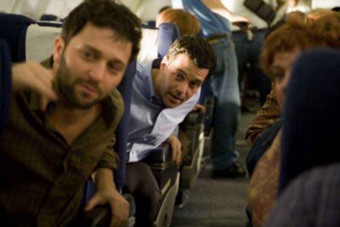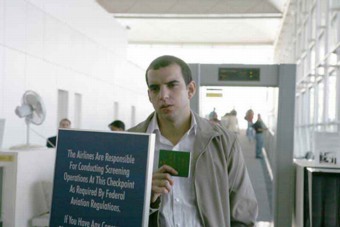|
A
Summer Side Note:
The
summer is upon us and as this site's unofficial more mainstream
movie correspondent, I was hoping to be able to say something
positive and reassuring about the latest summer releases
like 'it's not that bad out there in Tinsel Town'. Oh, but
it is. I've seen Mission Impossible III, X Men: The Last Stand and The Da
Vinci Code and would you believe it. I can't think
of a single valid reason to write a word on any of them,
much as I have a spleen itching to vent. Let's just say
hopes are not unrealistically raised this year for a summer
movie to care about. Cars may do it but
why do I feel that a closer Pixar alliance with Disney cannot
possibly be healthy? Superman? Too fond
of Reeve's first one despite Bryan Singer's involvement
and the wholesale kidnapping of Brando's and Williams' contributions
to the late seventies movie. I'm far more partial to Singer's
Holmes-inspired TV show, House. Feeling
the same apathy towards Miami Vice despite
Michael Mann's authorial stamp, and what has Colin Farrell
actually done to deserve such A-List adoration? No. The
only real chance of having some mainstream Hollywood fun
this summer is with (gasp) Jerry Bruckheimer (I have a very
clean tongue, what with all that soap). I think it's Captain
Jack Sparrow to the rescue – at least I hope it is...
So
the best of the summer movies so far is a true story of
forty-four very real and horrifying deaths five years ago…
Not popcorn material at all.
"...presenting
a believable truth." |
Paul
Greengrass, director, quoted on the official web site. |
Hell.
If United 93 was close to how it really
happened then the valiant struggle for control of the fourth
aircraft on September 11th, 2001, was as horrific a situation
to be in as I can imagine. Dying, scared and confused in
the flash of an explosive impact – as happened to the passengers
on the other three planes – was one thing. But knowing for
a full twenty minutes that you were going to be the hapless
victims of a suicide mission must induce a terror that would
cripple the mind. Or did the unspeakable situation into
which these men and women were plunged free their minds
to act? Each of the victims has been nominated for a Congressional
Medal of Honour (sorry, 'Honor') for outstanding bravery
(trust the US government to find heroes where crucially
and importantly they were simply ordinary people, two of
whom were killed at the start of the hijack who by definition
knew nothing of the aircraft's fate). Well, knowing what
the other passengers knew, would you sit there and do nothing?

Paul
Greengrass, the British director responsible for one of
the best mainstream thrillers of recent years (The
Bourne Supremacy) and no stranger to edgier fare,
commands the frame of United 93. It twitches
nervously as if the camera operator was trying to dislodge
an insect that had breached his clothing. This meta-hand-held
style is here to stay (that is until the next visual style
kicks in) and for this dramatized documentary, it works
superbly well. Some critics have dubbed this extraordinarily
faithful real-time film the 'feel bad' movie of the summer.
Well, I can sympathise. Watching it is painful. You want
the bloody terrorists/freedom fighters (pick your side)
to get it over with. I do not say 'pick your side' lightly.
I simply mean that I found the big 9/11 question 'why?'
– which came from a lot of US citizens – startling in its
naiveté and after Iraq's recent Al-Haditha's massacre
of innocents, whose side you see things from is a matter
of informed personal choice. Flight 93 featured two sides
fighting back; one, a radical movement hijacking both Islam
and the aircraft that regarded the US as the 'Great Satan'
for some pretty sound reasons despite the religious dogma
and civilian-killing methodology and two, ordinary Americans
faced with a choice. Go down with a whimper or go out fighting.
Watching
this movie is like waiting for the dentist's chair but I
mean that in the best possible way. You are supposed to
feel uncomfortable, powerless and disbelieving. Oh, and
let's add empathy. You are continually asking yourself "What
would I do?" in the same situation and you also will
the crew and passengers not to take off. Because of a delay,
most of the passengers of the doomed flight had already
worked out what was going on as all three earlier targets
had been hit. As Greengrass reminds us, these forty-four
people were the first to inhabit a post-9/11 world, the
first of us fully conscious of how things had changed. The
significance of this knowledge to the passengers ended a
few minutes after 10am on that extraordinary morning.
There
are very few details not generally known about 9/11 but United 93 reveals two nuggets that, to
my knowledge, were significant for very human reasons. Probably
the first two well known facts about Flight 93 are the urgent
calls of love from those who knew they were about to die
and passenger Todd Beamer's telephonic pronouncement of
"Let's roll!" In the last desperate minutes of
Flight 93's existence, we learn that one of the passengers
was a pilot (a light aircraft pilot but a pilot nonetheless)
and another was an Air Traffic Controller for many years.
Do you know what that meant to those knowing they were in
the hands of suicidal fanatics?
Hope.
In
the last minutes, there was hope. I didn't know whether
to cry or scream. As John Cleese reminded us in Clockwise,
it's not despair that's so debilitating. It's the hope that
despair could be averted at the last minute. There was a
last minute on Flight 93. It bloomed in an explosion on
New Jersey soil with the echoes of some insane incantation
to an imaginary deity recorded for the somber crash investigators
to pore over.
If
it is even vaguely possible to remove the baggage from the
subject matter, United 93 the movie would
still be a real nail-biter (but no one would believe it
as fact, I mean people don't commit suicide to make a point,
do they?) As Jonathan Miller pointed out in his insightful
three-part documentary A Brief History of Disbelief,
the fanatics and the victims had religious belief in common.
In one telling scene in the movie, everyone's praying. As
one faces death, it's not uncommon for rational people to
turn to an irrational belief in God. It's usually in the
form of the impossible prayer – "May two and two not
equal four... just for me... Right now..." The hijackers,
conditioned into believing some inordinately odd things
about an afterlife, go to their deaths screaming the name
of their own deity. Well, yeah. You could pray to the equivalent
set of imaginary friends that the hijackers answer to. Allah
says "Kill people in my name!" God says "I
agree with Allah, in principle." Just check out the
Old Testament. I suppose it all comes out in the wash. All
that blood, earthly drains stained ochre...

Is
it entertaining to watch a realistic portrayal of forty-four
deaths in a matter-of-fact re-enactment of an horrific,
historical event? Yes. It is. But in a very empathic manner.
There's a little voice whispering "happy it wasn't
you on board, aren't you?" all the way through. Technically
the film is solid. John Powell's music is understated (as
it bloody well should be) and very effective. I happen to
think his score for The Bourne Supremacy,
is absolutely extraordinary – powerful and lyrical in equal
measures. Here Powell gets to give us somber drums to open
and rising orchestral paranoia when required. To be frank,
this story needed no musical accompaniment but as convention
dictates – as drama dictates – Powell delivers the goods
with sensitivity and élan.
The
performances are all excellent in (mostly) their utter everyday
banality. It's an unfussy cast with one or two 'real' people
playing their own parts in this re-enactment. The performance
that stands out is that of Khalid Abdalla as lead terrorist/freedom
fighter pilot Ziad Jarrah. Looking somewhat alarmingly like
A.A. Gill, the defiantly Scottish 'Times' TV and food critic,
we are invited to feel his pain, his indecision just by
having the camera close to him. He's the terrorist/freedom
fighter who has trained to fly the plane and the movie humanizes
him in as much as a man with his qualities can be humanized.
We think of 'humanizing' as softening the edges, letting
a little bit of understanding in. But if we acknowledge
what it is to be human, what it is to be one of us with
all our potential malevolence, our capacity for harm, then
the verb crystallizes into a brittle contradiction. That
apart, Abdalla successfully communicates the fear and opposing
forces that had to be flooding his nervous system as the
men went into action.
Yes,
there is an amazing sense of "Get the bastards!"
as the passengers hurl down the aisle and attack the hijackers
but that really is as 'Hollywood' as it gets. The ensuing
struggle as two of the hijackers go down (it's never explicitly
shown but you have to imagine they were probably beaten
to pulps) is heart-rending – who in the audience does not
know how this story ends? Hands fight in close ups as we
look out of the cockpit window. Thankfully there are no
external shots of Flight 93 crashing, no fancy nods to genre
expectation. This film does justice to something other than
the victims and the hijackers although it pays great respect
to all participants. It does justice to what we know as
the truth of that event. I don't think Greengrass or anyone
else could have done a better job.
|